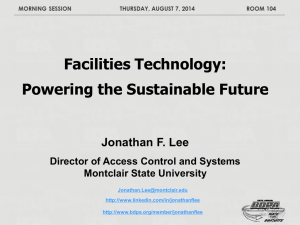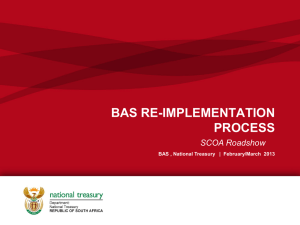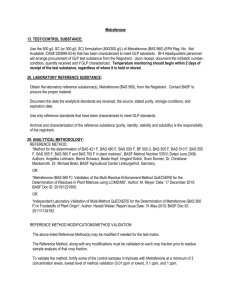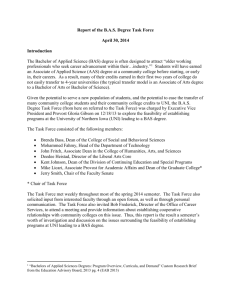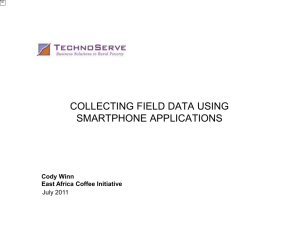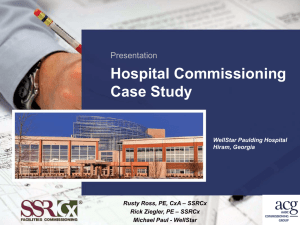Antarctic fieldwork requirements questionnaire
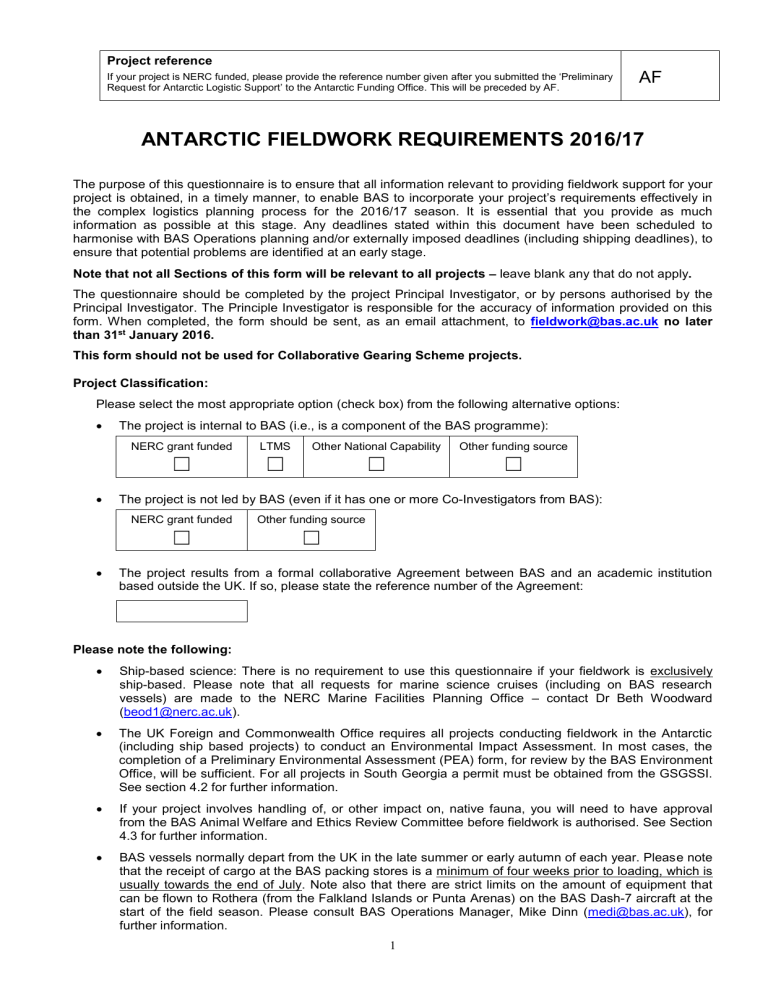
Project reference
If your project is NERC funded, please provide the reference number given after you submitted the ‘Preliminary
Request for Antarctic Logistic Support ’ to the Antarctic Funding Office. This will be preceded by AF.
AF
ANTARCTIC FIELDWORK REQUIREMENTS 2016/17
The purpose of this questionnaire is to ensure that all information relevant to providing fieldwork support for your project is obtained, in a timely manner, to enable BAS to incorporate your project’s requirements effectively in the complex logistics planning process for the 2016/17 season. It is essential that you provide as much information as possible at this stage. Any deadlines stated within this document have been scheduled to harmonise with BAS Operations planning and/or externally imposed deadlines (including shipping deadlines), to ensure that potential problems are identified at an early stage.
Note that not all Sections of this form will be relevant to all projects
leave blank any that do not apply .
The questionnaire should be completed by the project Principal Investigator, or by persons authorised by the
Principal Investigator. The Principle Investigator is responsible for the accuracy of information provided on this form. When completed, the form should be sent, as an email attachment, to fieldwork@bas.ac.uk
no later than 31 st January 2016.
This form should not be used for Collaborative Gearing Scheme projects.
Project Classification:
Please select the most appropriate option (check box) from the following alternative options:
The project is internal to BAS (i.e., is a component of the BAS programme):
NERC grant funded
☐
LTMS
☐
Other National Capability
☐
Other funding source
☐
The project is not led by BAS (even if it has one or more Co-Investigators from BAS):
NERC grant funded
☐
Other funding source
☐
The project results from a formal collaborative Agreement between BAS and an academic institution based outside the UK. If so, please state the reference number of the Agreement:
Please note the following:
Ship-based science: There is no requirement to use this questionnaire if your fieldwork is exclusively ship-based. Please note that all requests for marine science cruises (including on BAS research vessels) are made to the NERC Marine Facilities Planning Office – contact Dr Beth Woodward
( beod1@nerc.ac.uk
).
The UK Foreign and Commonwealth Office requires all projects conducting fieldwork in the Antarctic
(including ship based projects) to conduct an Environmental Impact Assessment. In most cases, the completion of a Preliminary Environmental Assessment (PEA) form, for review by the BAS Environment
Office, will be sufficient. For all projects in South Georgia a permit must be obtained from the GSGSSI.
See section 4.2 for further information.
If your project involves handling of, or other impact on, native fauna, you will need to have approval from the BAS Animal Welfare and Ethics Review Committee before fieldwork is authorised. See Section
4.3 for further information.
BAS vessels normally depart from the UK in the late summer or early autumn of each year. Please note that the receipt of cargo at the BAS packing stores is a minimum of four weeks prior to loading, which is usually towards the end of July. Note also that there are strict limits on the amount of equipment that can be flown to Rothera (from the Falkland Islands or Punta Arenas) on the BAS Dash-7 aircraft at the start of the field season. Please consult BAS Operations Manager, Mike Dinn ( medi@bas.ac.uk
), for further information.
1
Proper provision must be made for the clean-up and removal of equipment, cargo, laboratory chemicals
– and field-based experiments – after the project has been completed.
Some personnel deployments and uplifts to or from coastal Antarctic or sub-Antarctic localities might be made by HMS Protector (at BAS request), rather than by a BAS ship.
Transport to/from the research stations at Bird Island, Signy and King Edward Point (on South Georgia) is dependent on ship calls, which are infrequent. The schedules and itineraries of BAS ships are planned quite close to the commencement of the Antarctic fieldwork season. Note that the schedules and itineraries are liable to change, sometimes at short notice, to meet changing operational requirements.
2
TABLE OF CONTENTS:
1.
1.1 Title of project
1.2 Science summary
1.3 Project investigators
1.4 Fieldwork personnel
1.5 Outline field plan
2.
PROJECT SUPPORT REQUIREMENTS ON STATION
2.1 Research Station
2.2 Laboratories
2.1.1 Laboratory facilities required (all stations)
2.2.2 Facilities required at Halley
2.2.3 Facilities required at Bird Island
2.3 Boating and Diving Support
2.4
Fieldwork from station
2.5
Technical Support
3.
3.1 Field Personnel
3.1.1
Scientists in field
3.1.2
Field General Assistants
3.2 Preferred input and uplift times
3.3 Location of field parties
3.4 Brief description of the nature of the field activity
3.5 Logistic support
3.5.1
Field units (and vehicles)
3.5.2
Special field equipment
3.6 Aircraft
3.6.1
Aircraft Support
4.
5.1 Next steps
5.2 Actions and associated deadlines in preparation for fieldwork in the Antarctic
11
4.1 Cargo and Transport Requirements for inter- and intra-continental movements
4.2 Environment
4.3 Animal handling
4.4 Ionising radiation
4.5 Power tools and equipment
4.6 Explosives
4.7 Use of remote instruments
4.8 Data Management Plan
14
14
4.9 BAS Mapping and Geographic Information Centre (MAGIC) 15
5.
NEXT STEPS AND SCHEDULE LEADING UP TO THE 2015/2016 ANTARCTIC FIELD SEASON
15
11
13
13
13
14
14
15
15
9
10
10
10
11
11
9
9
9
9
9
10
5
5
5
5
6
7
7
7
8
4
4
4
4
4
4
3
1. PROJECT SUMMARY
1.1 Title of project
For grant-funded projects:
Does the project require fieldwork support for more than one season? (Y/N)
If so, for which season (first, second, etc.) are the current preparations being made?
1.2 Science Summary
Please provide a brief description of the proposed research in simple terms and in a way that could be publicised to a general audience (up to 500 words).
1.3 Project Investigators
Principal Investigator
Co-Investigator (1)
Co-Investigator (2)
Co-Investigator (3)
Co-Investigator (4)
Co-Investigator (5)
Co-Investigator (6)
Name Institution Telephone E-mail
Please expand the table as necessary.
1.4 Fieldwork Personnel (not including Field General Assistants, to be assigned by BAS)
Please provide names and contact details of the fieldwork personnel . We understand that staffing of science projects can change at short notice prior to Antarctic deployment; we ask that you inform us of any changes as early as possible.
Name Institution Telephone E-mail
Principal
Investigator
Field worker (1)
Field worker (2)
Field worker (3)
Field worker (4)
Field worker (5)
Field worker (6)
Please expand the table as necessary and provide the number of people, if names are not yet known.
4
1.5 Outline field plan
Please provide an outline fieldwork plan for your project. This is especially useful if the project involves working at one or more localities remote from a field station. Expand the box as required and
– if appropriate – provide a map showing proposed locations.
Please note: Where the requirement is simply for maintenance, by BAS personnel, of instrumentation installed during a previous season, there is no need to provide an outline field plan. This is also the case if the requirement is solely for data download or instrument retrieval by BAS personnel.
For BAS staff only:
If your project is part of a Long Term Monitoring and Survey
(LTMS) programme, please check the appropriate box.
Marine
☐
Terrestrial
☐
Atmospheric
☐
Other
☐
2. PROJECT SUPPORT REQUIREMENTS ON STATION
2.1 Research Station
Please state which research station you require support at, together with the preferred timing (month and year).
Start (mm, yyyy) End (mm, yyyy) Duration (months)
Rothera
Halley
Bird Island
Signy
King Edward Point (KEP)
Other (state name)
2.2 Laboratories
2.2.1 Laboratory facilities required (all stations)
Please state ‘Y’ in response to the following questions if applicable and specify any requirements in the
‘Further details’ box below. Please leave blank if not relevant to your project.
Note that, if you will be going to Halley or Bird Island, please ensure that you also read – and complete as necessary
– Sections 2.2.2 and 2.2.3. If not going to either of these Stations, please continue to Section 2.3.
Laboratory Space
Will you require general laboratory bench space (m 2 )?
If so, please specify requirements in the box below.
Will you require specialist laboratory space (m 2 ) for microbiological and/or molecular or analytical work?
If so, please specify requirements in the box below.
Will you require ‘wet laboratory’ space (m 2 )?
If so, please specify requirements in the box below.
At Rothera and KEP only: Will you require Aquarium space (m 2 )?
If so, please specify requirements in the box below.
5
At Rothera and KEP only:
Will you require use of controlled environment laboratory space (m 2 )?
If so, please specify requirements in the box below.
At Rothera only:
Will you require use of the radioisotope lab (m 2 )? Generally, only the use of 3 H and
14 C is supported – please specify chemical form and specific activity requirements in the box below.
Other Laboratory Facilities
At Rothera only:
Externally exhausting fume hood (hours/week).
Recirculating fume hood (hours/week).
At Rothera only:
Microbiological Safety Cabinet (hours/week).
Furnace oven (Please specify temperature required; hours/week).
At Rothera and KEP only:
Drying oven.
Please specify temperature required; hours/week.
Growth cabinet.
Please specify temperature & light regime required; hours/week).
Spectrophotometer (hours/week).
Fluorometer (hours/week)
At Rothera only:
Gas supply. Please specify gas, cylinder size & pressure required.
At Rothera only:
Liquid nitrogen supply. Please specify quantity required and frequency of use.
Other specialist equipment. Please specify below.
Will you require office space (Desktop PC required? Internet access required?)
Instrument preparation space
Will you require electronic laboratory or workshop assembly space?
Sample Storage
+4°C cool storage (litres)
20°C freezer storage (litres)
80°C freezer storage (litres). Not available at Bird Island.
Chemical reagents
Please identify any high risk chemicals you will be using (e.g. toxic, concentrated acids/alkali, explosives, isotopes) and whether you intend to import these.
Further detail on laboratory requirements:
Please note:
You will be required to complete a full list of chemicals (if applicable) using a Chemical
Approvals Register (CAR) at a later date (please see fieldwork planning schedule on page 15).
However, for planning purposes, it is important to identify any high risk chemicals at this stage as they may be controlled or only permitted for use under certain circumstances in Antarctica.
If biological materials will be imported to the UK, please ensure that all the recipient departments hold the appropriate licence. Biological materials will be imported to the UK (in
June each year) by BAS ship and will be held at BAS Cambridge initially, before onward transport. For both these matters, please consult with Dr Elaine Fitzcharles ( emfi@bas.ac.uk
) in the first instance.
6
If you require science support from station staff (e.g. a Biological Assistant), then you need to specify the nature of the support and the amount of time required per week. For science support relating to marine biology or terrestrial biology, please confirm your requirements directly with the Senior Laboratory Manager at BAS, Dr Elaine Fitzcharles ( emfi@bas.ac.uk
).
2.2.2 Facilities required at Halley
Note that the items below are relevant to Halley Research Station only.
Please state ‘Y’ in response to the questions below if applicable and specify any requirements in the
‘Supporting comments’ box. Please leave blank if not relevant to your project. Any additional technical requirements should be stated in Section 2.5.
Is use of special facilities, such as the CASLAB, required?
Other (please specify):
Supporting comments:
Please confirm your requirements at Halley directly with the station Logistics Coordinator,
Caroline Lewis ( cjml@bas.ac.uk
).
2.2.3 Facilities required at Bird Island
Note that the item listed below is relevant to Bird Island only.
Does equipment need to run on station between midnight and 8 a.m. (Y/N)?
If ‘Yes’, please provide details here:
Please confirm your requirements at Bird Island directly with the station Science Manager,
Dr Andy Wood ( agw@bas.ac.uk
). Any additional technical requirements should be stated in
Section 2.5.
2.3 Boating and Diving Support
available from Rothera station
Boating support is also available at King Edward Point, South Georgia, although should be arranged via the
BAS-based KEP Logistics Coordinator, Rod Strachan ( rjstr@bas.ac.uk
).
Please state ‘Y’ as appropriate and specify any requirements in the ‘Further details’ box below. Please leave blank if not relevant to your project.
Boating and Diving Requirements
Will you require small boat support?
Is sampling required from boats?
If so, please state below the frequency per week and time (e.g., 3/1hr). Please also state volumes required per sampling period.
Is any equipment being deployed or recovered from boats?* (e.g. water sampling)
Is any equipment to be deployed in the water as part of your work?* (e.g. kit deployed in the water by divers, for example sediment traps)
Is boating transport to remote sites required? *
Is diving required for your work? *
Is anyone in your group intending to dive? (HSE part IV is essential for all divers) *
Is collection of live specimens required?
If so, please include a detailed description of the work below. It is likely a permit will be required for this work – see Section 4.4 (Environment) *
7
Further details:
*Please liaise with the Diving Officer at BAS, Dave Wattam ( dwat@bas.ac.uk
), about any Rotherabased boating or diving requirements.
2.4 Fieldwork from Station
Please state
‘Y’ as appropriate and specify any requirements in the ‘Further details’ box below.
Please leave blank if not relevant to your project.
Remote fieldwork whilst based at station
Is remote field work required?
If so, specify destination in the ‘Further details’ box.
Are vehicles required for this work?
Do you need the services of a biological assistant? If so, please specify the requirements in the ‘Further details’ box below.
Will any remote instrumentation be deployed or serviced during this work? If so, please specify the requirements in the ‘Further details’ box below.
Will electronic equipment be installed in the field? If so, please specify the requirements in the ‘Further details’ box below, including how and what size of batteries should be charged and the maximum dimensions of masts and wind turbines.
Do you have a requirement to use a portable generator in the field? If so, please specify the requirements in the ‘Further details’ box below and state how long the generator will need to be running for (total hours).
Is overnight use of field huts or tents required? If so, please give details below.
Will field equipment be operated in a field hut, or in some other form of shelter? Please provide details in the box below.
Will staff be required to travel and/or carry out fieldwork during the hours of darkness?
Please provide details in the box below.
Further details:
Please note:
For work away from the immediate station area, field safety staff may be required to support the activity. You must indicate what the time requirements are for your activities. All remote working outside the station local safe travel area will normally require working in pairs. You will also need to complete a Risk Assessment – see page 15 for further information and guidance.
To discuss your requirements, please liaise in the first instance with Caroline Lewis
( cjml@bas.ac.uk
) for Halley, Dave Wattam ( dwat@bas.ac.uk
) for Rothera, Rod Strachan
( rjstr@bas.ac.uk
) for Signy, Bird Island or KEP.
2.5 Technical Support
Please state
‘Y’ if applicable and specify any requirements in the ‘Further details’ box below. Please leave blank if not relevant to your project.
Nature of support
Mechanical
Instrument
Computer
8
Other
Further details:
Other facilities
Please state
‘Y’ if applicable and specify any requirements in the ‘Further details’ box below.
Please leave blank if not relevant to your project.
Will you require any building works, on station or in the field?
If so, please provide details below.
Will you have any significant additional power requirements? (peak kW)
Will you require technical support for installation and/or maintenance of equipment (e.g. aerials)? Enter Y if required and specify requirements in the box below.
Will you require remote cable runs or external support facilities?
Will you require dedicated vehicle support for local use?
Other.
Further details:
Please note :
Any requirements for station or field technical support need to be discussed in detail with the relevant support group. Materials for the work are expected to be provided, paid for and shipped in advance to the respective station.
Liaise in the first instance with Caroline Lewis ( cjml@bas.ac.uk
) for Halley, Dave Wattam ( dwat@bas.ac.uk
) for Rothera, Rod Strachan ( rjstr@bas.ac.uk
) for Signy, Bird Island, or KEP.
3. ‘DEEP FIELD’ PROJECT SUPPORT (i.e. involving field camps remote from a research station)
3.1 Field Personnel
3.1.1 Scientists in Field (weeks and numbers of scientists, must match names as submitted in Section 1)
From (Research Station) Weeks
Number in party
(excluding field assistants)
Rothera
Halley
Other (state name)
3.1.2 Field General Assistants (weeks and numbers in field party)
From (Research Station)
Rothera
Halley
Other (state name)
3.2 Preferred input and uplift times
Estimated dates:
Preferred input (earliest/latest dates)
Weeks Number
9
Routing for input
Preferred uplift (earliest/latest dates)
Routing for uplift
Reasons for restriction on input & uplift dates
3.3 Location of Field Parties
The location of field parties should be provided either by specifying a name from the searchable Composite
Gazetteer of Antarctica and/or by latitude and longitude. Detailed information can follow, but sufficient information should be provided to allow BAS to estimate the difficulty of access to the field sites.
Field Party Location (using names from Gazetteer) Latitude Longitude
3.4 Brief description of the nature of the field activity; distance to be travelled (if mobile); expected input and uplift site(s).
(For payloads to be transported
– see Section 4.1 referring to Cargo)
3.5 Logistic support
3.5.1 Field Units (and vehicles)
A field unit is one pyramid tent for occupation by two people and includes the relevant ancillary equipment. (Note: work on ice-free terrain may need skidoo with ice cleats. Please describe any such needs in section 3.4 above).
From (Research Station)
Total
Weeks
Number of people in party (not including Field General
Assistants)
Rothera
Halley
Other (state name)
3.5.2 Special Field Equipment
Some field parties require extra equipment such as work tents, satellite telephone, field electrical generators, snowblower or hot-water drill. These should be specified here. Please state
‘Y’ if applicable and specify any requirements in the ‘Further details’ box below. Please leave blank if not relevant to your project.
Will you require a portable generator?
Will you have any battery requirements?
Will you have any requirement for Glacio poles?
Will you require use of Bamboo poles for scientific use?
10
Will you require specific sledge types for scientific equipment?
Other
What is the overall weight (kg) of all scientific equipment to be carried into the field?
Further details:
3.6 Aircraft
3.6.1 Aircraft Support
Hours required for survey flying, or deploying and retrieving field parties, will be calculated by BAS
Operations. Please specify any additional special equipment required, e.g. radio echo sounding fit, and summarise principal flight lines required. Please supply a sketch map if appropriate, to clarify your request.
If continuous air support is needed at the fieldwork site, please check the box.
If you have airborne survey requirements, please check the box.
☐
☐
Station
If flying requirement is from Rothera station, please check the box.
If flying requirement is from elsewhere, check the box and give details below.
Supporting Comments
(Please specify special equipment required, e.g. Aeromagnetic fit):
☐
☐
Note:
4. GENERAL
Inland tractor traverses can reduce the logistics burden of aircraft field support. Identifying your project needs early may allow some opportunistic logistics work that will reduce aircraft usage.
Please liaise with Mike Dinn, BAS Operations Manager ( medi@bas.ac.uk
) to discuss any potential for utilising this option.
4.1 Cargo and Transport Requirements for inter- and intra-continental movements
The purpose of this section is to identify any special conditions/facilities needed to transport equipment, materials or samples between the laboratory in UK and a field site in Antarctica (southbound and northbound).
Note that BAS ships can provide regular stowage only at −20°C and +4°C. There is very limited capacity for storage at −80°C. Projects must provide their own controlled environmental cabinets if different storage conditions are required.
SOUTHBOUND
Please state
‘Y’ or volume, as indicated, and where needed in the season. Please leave blank where not applicable to your project.
Will cargo movements south and north be on vessels other than BAS vessels? If this is the case, please provide further information in the ‘Supporting comments’ box below.
11
General cargo – volume
Hazardous cargo:
Please note: a full Chemical Approvals Register (CAR) list will also be required and can be downloaded from http://www.antarctica.ac.uk/apfp/plan/health_and_safety.php
. Hazardous cargo may also include items not necessarily authorised by a CAR application; e.g specific types of batteries: lead acid or gel; lithium ion or metal; NimH or NiCad. Please contact Kath
Nicholson ( kani@bas.ac.uk
) in the first instance for advice if you need to ship lithium batteries.
Cylinder gases: specify type and number of cylinders in the supporting comments box below.
Explosives: specify UN number (four-digit number that identifies specific hazardous substances),
NEQ (net explosive quantity) and volume in the supporting comments box below.
Transport of radioactive isotopes (radionuclides): specify chemical form and specific activity in the supporting comments box below.
Freezer transport (
20°C), volume (litres)
Cool stow (+
4°C), volume (litres)
Other (state requirements)
Supporting comments:
NORTHBOUND
Please state
‘Y’ or volume, as indicated, and where needed in the season. Please leave blank if not applicable to your project.
General cargo
– volume:
Hazardous cargo:
Transport of radioactive isotopes (radionuclides): specify chemical form and specific activity in the supporting comments box below
Biological materials (please specify details in the supporting comments box below)
Cool stow ( +4°C), volume (litres or m 3 )
Freezer transport (
20°C), volume (litres or m 3 )
Freezer transport (
8 0°C), volume (litres or m 3 )
Supporting comments.
Please specify any special requirements, including type of biological materials to be transported)
Completion of a Biological Bill Of Lading (Bio-bol) is a condition of returning samples from
Antarctica. All biological material for return to UK must be notified to Dr Paul Geissler
( page@bas.ac.uk
) and relevant station managers.
INTRA-CONTINENTAL
Please state
‘Y’ or volume if indicated, and where needed in season. Please leave blank if not applicable to your project.
General cargo – please state volume
12
Will there be any hazardous cargo?
What is the destination for transfer? Please also specify any special requirements.
Note that BAS Operations will define a route of transfer, in consultation with Station Leaders.
Cargo transfer by BAS Dash 7 aircraft from the Falkland Islands or Chile:
Please provide a photographic image of all items above 100 kg weight, to assist handling operations at the port of departure.
General cargo
please state volume
Cargo weight – please give details on Cargo weight
Will there be any hazardous cargo?
When is the cargo required at Rothera?
Supporting Comments:
Please note: UK packing deadlines for this cargo can be prior to UK ship-borne cargo packing dates.
Cargo space availability is at a premium. You should therefore ensure that as much cargo as possible is pre-deployed to Rothera by sea, a year in advance . Some items might be made available on a
‘replacement by use’ basis; these may include glacio poles, generators and batteries. Please consult with BAS Operations Manager Mike Dinn, medi@bas.ac.uk
) to discuss your needs.
4.2 Environment
All Projects in Antarctica
The Protocol on Environmental Protection to the Antarctic Treaty (1991) and the UK Antarctic Act (1994, 2013) require all Antarctic activities to be subject to an Environmental Impact Assessment (EIA). (See below for projects at South Georgia.)
A Preliminary Environmental Assessment (PEA) form must be completed by the Principle Investigator of each project prior to commencement of the proposed fieldwork.
If the project is coordinated and staffed by BAS employees, the PEA form should be sent electronically to Clare Fothergill ( clathe@bas.ac.uk
) at the BAS Environment Office by 11 th May 2015.
Principal Investigators of NERC-funded projects, or researchers conducting fieldwork as part of a collaboration with BAS, should return the completed PEA form to the Antarctic Funding Office afibas@bas.ac.uk
by 11 th May 2015.
As part of the assessment, and to ensure that appropriate mitigating measures are in place, the BAS
Environment Office may wish to contact you to discuss the likely impact of your fieldwork on the environment or on future scientific activities. The Environment Office will also advise if you require a permit to undertake your proposed fieldwork. Further information on types of permits can be found on the Antarctic Permits webpage for external applicants and on the BAS intranet Environment Office permits page for BAS applicants.
All Projects at South Georgia
Any organisation or individual wishing to conduct either marine or terrestrial research on South Georgia or the
South Sandwich Islands requires a permit from the GSGSSI. The permit application is intended to help BAS and the GSGSSI to determine if the proposed research is feasible and, if so, what additional assessments and permits may be required.
If the project is coordinated and staffed by BAS employees the form should be sent electronically to
Clare Fothergill ( clathe@bas.ac.uk
) at the BAS Environment Office, by 30 th June 2015. Please see the
BAS intranet Environment Office permits page for further information. It should not be sent directly to the GSGSSI.
13
External applicants should contact the Antarctic Funding Office ( afibas@bas.ac.uk
) for further information in the first instance.
4.3 Animal Handling
Enter Y or N Comments
Is animal handling required for your project?
If you will be handling animals (including invertebrates as well as vertebrates), your project will need to be reviewed by the BAS Animal Welfare and Ethics Review Committee. Please contact Dr Simon Morley
( smor@bas.ac.uk
) if this is applicable to your project.
4.4 Ionising Radiation
Please note: risk assessments are obligatory for all fieldwork activities. Identify here any special risks that may require following up. All projects requiring the use of ionising radiations must be discussed and approved by the BAS Senior Radiation Protection Supervisor (RPS) Steve Marshall, smar@bas.ac.uk
Item
Enter
Y or N
Specify nature of risks or chemical / biological materials concerned
If you will require use of radioactive substances, please specify the radionuclide(s), the chemical form and the total specific activity. Note that, in general, BAS will support only the use of 14 C and 3 H, unless as a sealed source.
Further details:
4.5 Power Tools and Equipment
Item
Does work require use of any significant power tools?
(e.g.rock drill, chain saws etc)
NB: approved training is required and is not usually available on site.
Further details:
Enter
Y or N
Specify nature of risks or chemical / biological materials concerned
4.6 Explosives
Do you intend to use explosives during your fieldwork?
Will you require long term storage of explosives either in the field or on station?
Enter Y or N Comments
Please liaise with Dr Ed King ( ecki@bas.ac.uk
) regarding your requirements.
14
4.7 Use of remote instruments
Does your project require the deployment
/recovery of remote instruments in the deep field?
Please note clearly if air dropped.
Is data recovery or servicing of the instruments required?
Is your instrument a new design?
Enter Y or N Comments
Please liaise with Mike Rose ( mcr@bas.ac.uk
) regarding your requirements.
4.8 Data Management Plan
Enter Y or N Comments
Will this project generate large datasets which will require special archiving or storage?
Will there be a requirement to transfer large amounts of data from Antarctica to BAS/UK?
If
‘yes’, then estimate the overall amount and rate of data transfer. Note that the costs for data transmission must be included within your proposal.
Are there any significant data management issues?
All NERC supported projects require a data management plan. Sufficient resources for the management of data should have been included in the grant proposal. Please discuss your requirements with Peter Kirsch
( pjki@bas.ac.uk
).
4.9 BAS Mapping and Geographic Information Centre (MAGIC)
Enter Y or N Comments
MAGIC can prepare fieldwork support maps for projects. Will your project require this service?
Do you wish BAS to provide advice on access to geographic information, including mapping satellite imagery and aerial photography?
Please liaise with Dr Adrian Fox ( afo@bas.ac.uk
) regarding any mapping requirements you may have.
5. NEXT STEPS AND SCHEDULE LEADING TO THE 2015/2016 ANTARCTIC FIELD SEASON
5.1 Next Steps:
For NERC-funded projects led by university-based staff, or by staff at academic analogues, this completed questionnaire should be sent to fieldwork@bas.ac.uk
by 31 st March 2015. The same applies to projects resulting from a formal Agreement with BAS for scientific collaboration.
For projects led by BAS staff, this questionnaire should also be sent electronically to fieldwork@bas.ac.uk
by
31 st March 2015.
5.2 Actions and associated deadlines in preparation for fieldwork in the Antarctic:
Please note:
Principal Investigators are responsible for ensuring that the following actions are undertaken in preparation for fieldwork. Any queries regarding the schedule below should be sent to fieldwork@bas.ac.uk
in the first instance.
15
Schedule post-submission of the Antarctic Fieldwork Requirements form:
Action
Pre-season Briefing Meeting.
Preliminary Environmental
Assessment form (please append the BAS Chemical
Approvals Register form if applicable
– see below)
Complete the BAS Chemical
Approvals Register (CAR) form (if applicable)
Discuss arrangement for importing biological samples into the UK (if applicable)
Completion of science field project risk assessment
Deadline Comments
23 rd April
2015
Invitations to this meeting will be sent together with this
Antarctic Requirements form. Any questions should be referred to Mike Dinn, Operations Manager
(medi@bas.ac.uk)
11 th May
2015
If the project is led by a BAS-based Investigator, please refer to: https://ishare.apps.nerc.ac.uk/basintranet/PeopleAndTea ms/environment/antarctica/EIA/Pages/default.aspx
.
If the project is not led by a BAS-based Investigator, PEA forms can be downloaded from the following website: http://www.antarctica.ac.uk/apfp/plan/environmental.php
.
11 th May
2015
11 th May
2015
11 th May
2015
Further information can be found at: http://www.antarctica.ac.uk/apfp/plan/health_and_safety.p
hp
This can be appended to the PEA form.
Further information can be found at: http://www.antarctica.ac.uk/apfp/plan/importing-biologicalsamples.php
or contact Dr Elaine Fitzcharles – emfi@bas.ac.uk
If the project is led by a BAS-based Investigator, please refer to: https://ishare.apps.nerc.ac.uk/teams/bas_risk/SitePages/
Science%20Project%20Risk%20Assessment.aspx
If the project is not led by a BAS-based Investigator, please contact Steve Marshall, the Health and Safety
Adviser in the first instance: ( smar@bas.ac.uk
).
Completion of detailed project plan, Standard
Operating Procedures and related risk assessments
(e.g. COSHH)
30 th June
2015
All risk assessments must be completed and approved by
BAS prior to commencing work.
Please contact Elaine Fitzcharles in the first instance
– emfi@bas.ac.uk
Submit Antarctic Permit applications (if applicable)
30 th June
2015
Complete summer visitor forms (Includes medical forms)
Ensure all equipment is suited to Antarctic operations
30 th June
2015
30 th June
2015
Discuss shipment of Cargo to and from Antarctica
30 th June
2015
If the project is led by a BAS-based Investigator, please refer to: https://ishare.apps.nerc.ac.uk/basintranet/PeopleAndTea ms/environment/antarctica/permits/Pages/default.aspx
.
If the project is not led by a BAS-based Investigator, further information on permits, including the application form can be found at: http://www.antarctica.ac.uk/apfp/plan/permits.php
.
Further information can be found at: http://www.antarctica.ac.uk/staff/antarctic_visitors/introduc tion.php
Further information can be found at: http://www.antarctica.ac.uk/apfp/plan/equipment.php
Further information can be found at: http://www.antarctica.ac.uk/apfp/plan/cargo.php
Please note that a cargo packing form must be completed for each item of cargo and submitted electronically to BAS shipping (Kath Nicholson, kani@bas.ac.uk
) prior to your arrival of cargo. For shipment of hazardous goods there is a separate cargo packing form. Hazardous material must be contained in the manufacturer’s packaging and accompanied by a Material Safety Data Sheet (MSDS) and list a Chemical Approvals Register number. Cargo packing forms can be downloaded from the link above.
16


